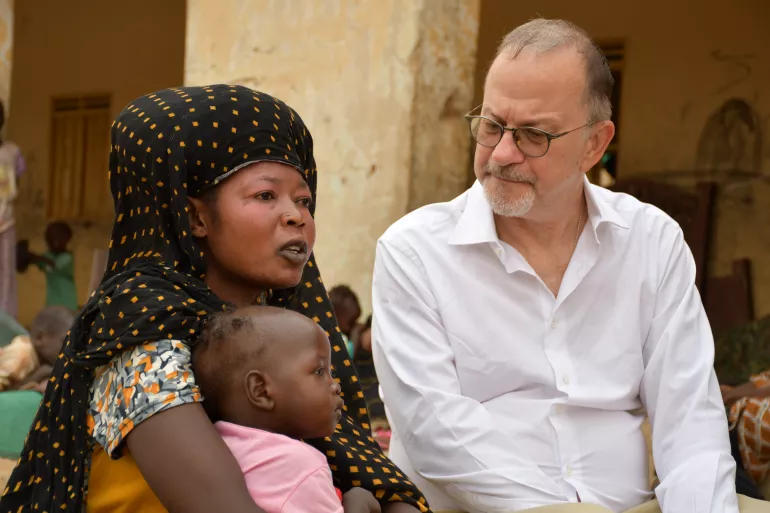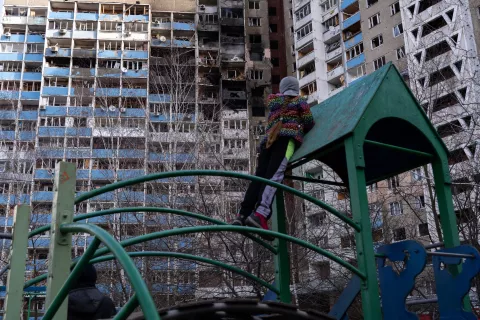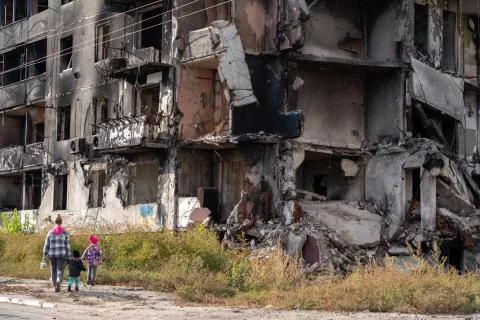UNICEF Deputy Executive Director Ted Chaiban’s remarks on the situation of children in Sudan, at the Daily Press Briefing by the Office of the Spokesperson for the Secretary-General
As prepared for delivery

NEW YORK, 4 August 2023 — "Good afternoon. Last week I was in Sudan, a country I have visited many times over the past 25 years, a country I lived in 18 years ago, and a country where children have consistently borne the brunt of recurring violence, upheaval and displacement.
“It is no exaggeration to say that the situation facing children in Sudan today is unprecedented. Before the war erupted on 15 April, Sudan was already grappling with a humanitarian crisis. Now, more than 110 days of brutal fighting have turned the crisis into a catastrophe, threatening the lives and futures of a generation of children and young people- who make up over 70 per cent of the population.
“The numbers are staggering. Almost 14 million children – a number roughly equivalent to every single child in Colombia, France, Germany, or Thailand – are in dire need of humanitarian support. 1 out of every 2 children in Sudan are now facing unimaginable challenges to their safety and well-being. Every single day.
“1.7 million children have been driven from their homes – parents are making the impossible choice to uproot their children and leave behind everything they have ever known - and are now on the move within Sudan or crossing its borders, vulnerable to hunger, disease, violence, and separation from their families. This number is in addition to the 1.9 million children who were displaced within Sudan prior to this latest crisis.
“At least 435 children have been reported killed in the conflict, and at least 2,025 children injured. That is an average of one child killed or injured every hour since the war began. We know that this is an underestimate, and the true toll is likely to be far higher. I saw the consequences of the atrocities committed against children and women during the darkest days of the Darfur conflict, 18 years ago. I am deeply concerned that we are witnessing a repetition of these terrible days.
“The ramifications of this crisis also extend beyond Sudan's borders, directly impacting countries like Chad, South Sudan and the Central African Republic, and the regional and global implications are significant.
“The impact of this crisis is shown in the faces and stories of the children, parents and grandparents I met whilst in Sudan and Adre, a village on the Chad-Sudan border, which is now hosting hundreds of thousands of women and children who have fled West Darfur in search of safety.
“I spoke to a woman named Fatma in Adre. She had come across from Geneina into Chad with her three children and spoke of going through 11 checkpoints to get there, each requiring a bribe to get through with the constant fear of gender-based violence. Children coming dehydrated, malnourished, arriving in a weakened state, many on the verge of death. In Attbara, north of Khartoum, I spoke to an 11-year-old boy who described his harrowing journey getting out of Khartoum, witnessing the horrors of the war and missing his friends, his home and everything he left behind.
“Each and every day, children are being killed, injured, abducted, and seeing the schools, hospitals and the vital infrastructure and life-saving supplies they rely on damaged, destroyed or looted. We have received reports of abductions, recruitment of children into armed groups, ethnically targeted violence, and gender-based violence against women and girls. Three million children under five are malnourished with 700,000 at risk of severe acute malnutrition and mortality. 1.7 million children under the age of one are at risk of missing critical vaccinations, raising the risk of disease outbreaks. In White Nile State, we have a lethal combination of acute watery diarrhoea, measles and malnutrition. Unless this is contained the consequences could be severe.
“Amid the devastation of the conflict, it was inspiring to see the dedication of UNICEF and UN colleagues and our humanitarian partners and their determination to stay and deliver life-saving services for children and families. UNICEF, with partners, has reached over 3 million children and women with health supplies, 2.1 million people with safe drinking water, and 2 million children with screening for malnutrition—of which approximately 107,000 have received life-saving treatment. In addition, almost 200,000 children and caregivers are benefitting from psycho-social counselling, learning, and protection support, as well as play activities and the chance to just be a child again, including through over 400 safe spaces established across the country.
“To date, UNICEF delivered over 5,500 metric tons of lifesaving supplies across Sudan, including in hotspot areas in Darfur, Kordofan, and Khartoum. However, while fighting continues, needs will only increase, with many vulnerable communities remaining out of reach of humanitarian support. Over the next 100 days, UNICEF urgently needs US$400 million to sustain and scale its crisis response to support the most vulnerable children.
“We cannot accept the toll this war is taking on Sudan’s children, their families. We remember the outrage when the Darfur crisis was at its utmost horror. We cannot go back to that situation. So, our message to the parties to the conflict is clear. Stop the fighting and commit to a durable cessation of hostilities. All parties must abide by their obligations under international humanitarian and human rights law to protect civilians – including preventing and ending grave violations against children. All parties should ensure the humanitarian community can safely reach children and families in need by respecting humanitarian workers and their premises, removing bureaucratic and administrative barriers and facilitating access.
“We hope the talks in Jeddah and other negotiation processes can urgently make progress in this regard.
“Thank you.”
#####



